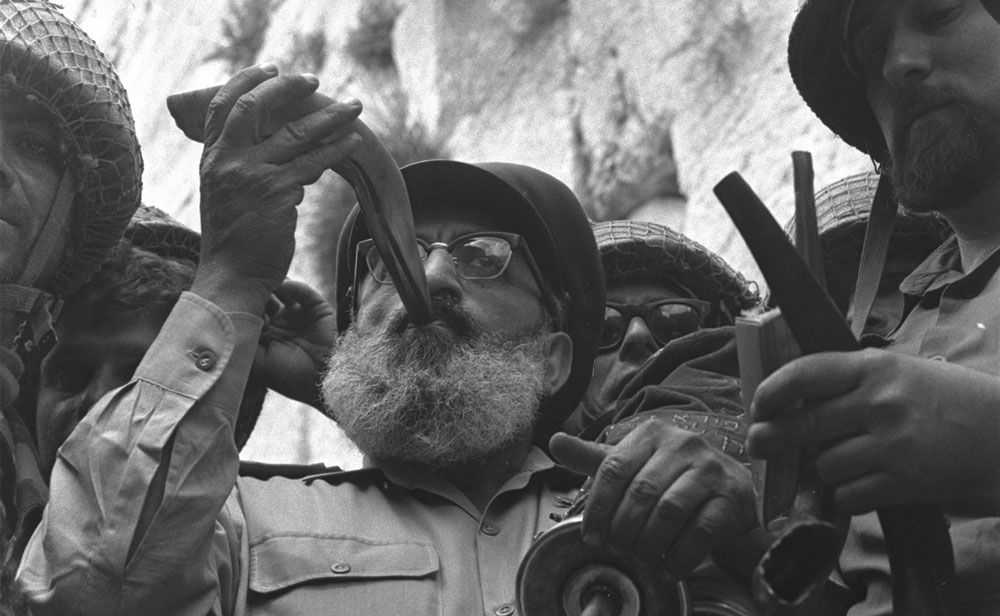With Might and Strength: Book Review with Jon Duker

During a ceasefire during the 1948 War of Independence, Israel Defense Forces (IDF) Chief Rabbi Shlomo Goren made an agreement with the Jordanian government for him to cross over to Gush Etzion, a mountain range south of Jerusalem which was in Jordanian hands, to retrieve and subsequently identify the remains of the Jewish soldiers who fell in battle. After much back and forth, they came to an arrangement. But one matter was unsettled - where would Rabbi Goren cross into Jordan? The Jordanians would not allow him to cross via the Mandelbaum Gate in Jerusalem, which was the official crossing point. This left one other option - crossing the minefield-pocked no man's land between Israel and Jordan.
In his memoir (published in English as With Might and Strength: An Autobiography), Rabbi Goren tells how he dealt with this precarious circumstance.
"I assessed the situation - the ground ahead of me was strewn with rocks, and between each rock was dirt. There couldn't be any mines on the rocks themselves, so the mines must be between the rocks. If I walked between the rocks, mines would most certainly start exploding on all sides. Thus, I planned to be careful, to jump from one rock to the next, and in that way save myself from the mines and cross safely to the other side. “I'm coming over!” I shouted to them, and started to cross. I stepped on the first rock and looked for the closest rock to step on next. I planned my route and jumped from one rock to the next. Each time I reached a rock, I reassessed my situation, and sometimes there wasn't another rock that was close enough for me to jump to safely. There were times when I landed on the slope of rock and almost fell, and I stretched out on the ground between the rocks. I told them that I wanted a stick that I could use so I wouldn't fall. They threw a tree branch over to me. I also used the branch to reach out and brush the dirt off the next rock, so I would have a clean place to land. After three quarters of an hour, I reached the other side. The Arabs stood with their eyes wide in astonishment and could not believe I had made it. The last rock was quite far from where the men were standing, so I took a giant leap and almost knocked some of them over. By the time I had finished crossing the no-man's-land, a few dozen Arabs had gathered to watch me and they started applauding (p. 236-7)."
Shlomo Goren (1917-1994) was born in Poland and moved with his family to British Mandatory Palestine (pre-state Israel) in 1925. His memoir follows his youth and young adulthood from the shtetl in Poland to kibbutz in Palestine, on to his studies in yeshivah and university, and concludes with his service as Chief Rabbi of Israel. But the most captivating sections are where he describes his activities as the Chief Rabbi of the IDF in the period from the War of Independence in 1948 until after the Six Day War in 1967 (he left the position in 1972). As the first Chief Rabbi of the IDF, he played a formative role, together with founding Prime Minister David ben Gurion, in creating an army that sought to be inclusive of observant soldiers and provide for their unique physical and spiritual needs – though these two titans occasionally clashed on specifics. The Six Day War is described as a whirlwind of activity as he frantically traveled to the Sinai and then to Jerusalem and the West Bank, keeping up with, and occasionally accidently surpassing, the IDF units as they conquered territories filled with Jewish significance. In addition to being one of the first at the Western Wall – from where we have inherited the iconic image of Rabbi Goren blowing shofar – he was also one of the first Israelis to climb Mount Sinai and pray at the Patriarch’s tomb in Hebron.
The book discussed Rabbi Goren’s halakhic rulings (based on Judaic law), much of which were so creative and groundbreaking that they have not found much acceptance (even in today’s religious Zionist community) and spends some time on politics related to the various offices that he held. But hundreds of years from now, when stories of this incredible man are told, it likely will be tales of his mesirut nefesh (self-sacrifice) to help Israel’s soldiers, such as jumping from rock to rock to reclaim our fallen heroes.
With Might and Strength: An Autobiography
Edited by Avi Rath and translated by Miryam Blum, (Maggid Books,2016)
Reviewed by Jon Duker
